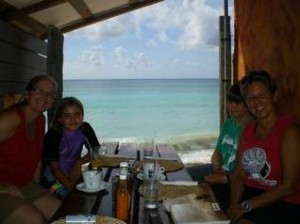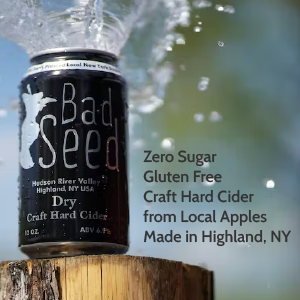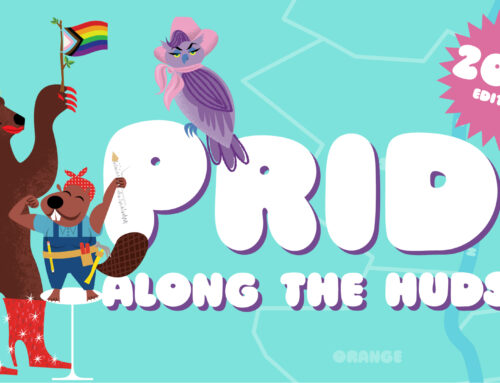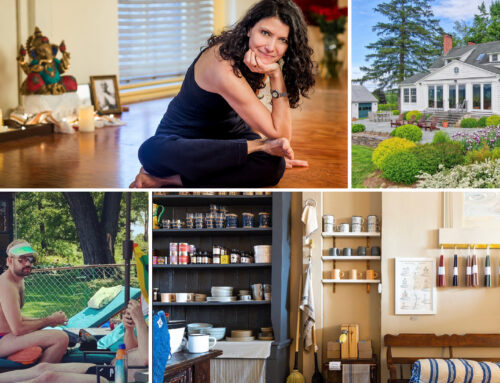Gay Parents Gain Acceptance
As Printed in The Poughkeepsie Journal, April 24, 2010

Same-sex parents Meg Stewart, left, and Jill Schneiderman, right, pose with their daughter, Tillie and son, Caleb. "We made great efforts to become parents. It wasn't an accident," said Schneiderman. (Submitted photo)
When Jill Schneiderman and Meg Stewart decided years ago to have a family, the idea of same-sex parenting was not unheard of, but it certainly wasn’t common, either.
In the 17 years they’ve been a couple, including 12 as parents, they’ve watched American society become more accepting of the idea of parenting by gays and lesbians. And in a recent interview, they advised same-sex couples or gay and lesbian singles who yearn to be parents to not let remaining discrimination, or biological roadblocks, to stand in their way.
“It’s becoming less of a challenge,” said Schneiderman, a Vassar College earth science professor, of societal disapproval. “If you have the impulse to make a family, you should definitely do it. Being a parent is the greatest thing that ever happened to me.”
“We made great efforts to become parents. It wasn’t an accident. They know they were very, very wanted,” she said, adding she feels children of divorce have a much more difficult time than those from an intact family like hers.
According to various federal agencies, including the U.S. Department of Health and Human Services and the U.S. Census, it is estimated 10 percent of all U.S. households are homosexual, that between 6 million and 14 million children are being raised in a gay or lesbian home and that about 65,000 adopted children have lesbian or gay parents.
Some same-sex couples who want to be parents choose the medical route, using egg or sperm donors and/or surrogates; others choose adoption, an alternative that is slowly becoming more common as discrimination abates, experts say.
“It’s not easy being a parent. There are challenges for anybody,” said Stewart, echoing Schneiderman. “But it’s the best thing that’s happened in my life.”
Schneiderman, 50, and Stewart, 48, were married in Massachusetts, one of only a handful of states that have legalized gay marriage.
They spoke about their lives as moms to daughter Tillie, 9, and son Caleb, 12, during a Skype interview from their temporary home in Barbados.
That’s where Stewart is teaching and doing research as a Fulbright Scholar at the University of the West Indies. She is an “educational technologist” who teaches educators how to use technology in learning.
She formerly worked at Vassar College as an academic computing consultant, but lost her job.
When they return from Barbados later this year, they’ll return to their home near Vassar. The children are in public schools in the Arlington Central School District.
Previously, the women were “house fellows” at Vassar, overseeing the dorm where they and the children lived.
“We were nothing out of the ordinary,” they said of how their lesbian-headed family was treated, adding the staff of house cleaners, security guards and others on campus who saw them in their everyday lives were especially accepting of their lifestyle.
“They just accepted us and saw us as a family,” Schneiderman said.
The two parents said they have been proactive from the start in talking about their family and educating people such as teachers or day-care providers on gay and lesbian parenting. They’ve provided books appropriate for classroom use and had special meetings for teachers or day-care providers.
The books may not have always been used in classes, but at least they were available, they said. They’ve also taught their children the proper words to use when asked, or teased, about their family.
Those strategies are best, said Claudia Stallman, project director at the Lesbian and Gay Family Building Project in Binghamton, N.Y., an upstate resource organization that covers both Dutchess and Ulster counties.
“We learn as parents to pave the way for our children and our families and provide language to the people in the institutions so the children don’t have to do that,” Stallman said. “One of our strategies is to empower the parents to be advocates for their families.”
Stallman used an example where educating other adults could have helped. A young child in an upstate school was sent to the principal’s office when she used the word “gay” in describing her family. A school worker told her not to use that word, and she was punished by being sent to the principal.
Some parents, such as Schneiderman and Stewart, approach individual teachers. Others, Stallman said, speak at staff meetings or PTA meetings. While a gay or lesbian person or couple may have been more private before they had children, those days are over once a child is in the picture because the child will want to talk about his or her family in school and to friends.
“You’ll have no choice whether to be out as a gay person or not. Your children will ‘out’ you,” Stallman said.
Fred Mayo of New Paltz, 65, gay and a grandfather, has an entirely different family story.
He was married to Lyn Mayo for 25 years and did not come out as a gay man until they separated. Their children were grown, and he was well into middle age.
He said his strict New England upbringing and the time period in which he was raised prevented him from being honest about his homosexuality. He says while the family changed in some ways after he came out, he is still the father and grandfather he always was, and maybe even a better one because he can truly be himself.
One of his biggest joys now are the times he gets to host family dinners with his partner, Maurice Dorsey, 62, to whom he is engaged, or when he gets to babysit his newest grandchild, Nev, a 5-month-old girl.
“She just knows it’s love,” Mayo said of the baby. “Nobody in the family has any criticism,” he said of his gay life. “It’s a non-issue. It does not matter when family loves each other.”
His ex-wife, who also lives in Ulster County and joins in family celebrations at Fred’s house, said their two children and eight grandchildren take cues from how she and her former husband treat each other.
“We’re good friends. I think we have both worked hard to make it easy between us, therefore, it’s easy for them to be with us,” Lyn Mayo said. She added it may have been difficult for her children at first, and even she moved across the country for a few years to come to terms with the end of her marriage.
But now, back home, she accepts and embraces her former husband’s new life.
“After 25 years of marriage, you’re basically friends, and why would you not want what’s best for that person,” she said.
Members of Mayo’s family, and others in families with gay parents or grandparents, said support from friends is important, and they can’t waste energy or time on people who don’t accept a family structure different from the mainstream.
Schneiderman and Stewart, for example, said they are friends with a number of families like theirs, with lesbian parents, which normalizes things for their children. They also said their extended families have been very accepting from the start.
“I surround myself with people who are like me and have the same beliefs as me,” said Shara Witeman, Mayo’s daughter-in-law and the mother of the new baby. “If someone was negative or prejudiced, I don’t think I could associate with them.”
Stallman, herself a parent with her lesbian partner, said that in some cases, the arrival of a baby or adopted child can smooth over rifts in families caused by members not accepting of a lesbian or gay relationship.
Gay and lesbian parents and grandparents said they have found some of the benefits for children in their families are that they learn tolerance of those who are different, and that their families have good communication between them because they’ve talked a lot about their family structure.
But there’s another benefit, some said. The children may also be more willing to take more chances in life because their families are a little different than others.
Schneiderman and Stewart noted that while in Barbados, they are in several minority groups, because they are Caucasian, as well as part of a lesbian household. They said this is an extra learning experience for their children.
“We put our best foot forward and go for it,” they said. “We’re somewhat brave and bold, and that’s a good model for our kids.”
“You’ll have no choice whether to be out as a gay person or not. Your children will ‘out’ you,” Stallman said.
Fred Mayo of New Paltz, 65, gay and a grandfather, has an entirely different family story.
He was married to Lyn Mayo for 25 years and did not come out as a gay man until they separated. Their children were grown, and he was well into middle age.
He said his strict New England upbringing and the time period in which he was raised prevented him from being honest about his homosexuality. He says while the family changed in some ways after he came out, he is still the father and grandfather he always was, and maybe even a better one because he can truly be himself.
One of his biggest joys now are the times he gets to host family dinners with his partner, Maurice Dorsey, 62, to whom he is engaged, or when he gets to babysit his newest grandchild, Nev, a 5-month-old girl.
“She just knows it’s love,” Mayo said of the baby. “Nobody in the family has any criticism,” he said of his gay life. “It’s a non-issue. It does not matter when family loves each other.”
His ex-wife, who also lives in Ulster County and joins in family celebrations at Fred’s house, said their two children and eight grandchildren take cues from how she and her former husband treat each other.
“We’re good friends. I think we have both worked hard to make it easy between us, therefore, it’s easy for them to be with us,” Lyn Mayo said. She added it may have been difficult for her children at first, and even she moved across the country for a few years to come to terms with the end of her marriage.
But now, back home, she accepts and embraces her former husband’s new life.
“After 25 years of marriage, you’re basically friends, and why would you not want what’s best for that person,” she said.
Members of Mayo’s family, and others in families with gay parents or grandparents, said support from friends is important, and they can’t waste energy or time on people who don’t accept a family structure different from the mainstream.
Schneiderman and Stewart, for example, said they are friends with a number of families like theirs, with lesbian parents, which normalizes things for their children. They also said their extended families have been very accepting from the start.
“I surround myself with people who are like me and have the same beliefs as me,” said Shara Witeman, Mayo’s daughter-in-law and the mother of the new baby. “If someone was negative or prejudiced, I don’t think I could associate with them.”
Stallman, herself a parent with her lesbian partner, said that in some cases, the arrival of a baby or adopted child can smooth over rifts in families caused by members not accepting of a lesbian or gay relationship.
Gay and lesbian parents and grandparents said they have found some of the benefits for children in their families are that they learn tolerance of those who are different, and that their families have good communication between them because they’ve talked a lot about their family structure.
But there’s another benefit, some said. The children may also be more willing to take more chances in life because their families are a little different than others.
Schneiderman and Stewart noted that while in Barbados, they are in several minority groups, because they are Caucasian, as well as part of a lesbian household. They said this is an extra learning experience for their children.
“We put our best foot forward and go for it,” they said. “We’re somewhat brave and bold, and that’s a good model for our kids.”
Members of Mayo’s family, and others in families with gay parents or grandparents, said support from friends is important, and they can’t waste energy or time on people who don’t accept a family structure different from the mainstream.
Schneiderman and Stewart, for example, said they are friends with a number of families like theirs, with lesbian parents, which normalizes things for their children. They also said their extended families have been very accepting from the start.
“I surround myself with people who are like me and have the same beliefs as me,” said Shara Witeman, Mayo’s daughter-in-law and the mother of the new baby. “If someone was negative or prejudiced, I don’t think I could associate with them.”
Stallman, herself a parent with her lesbian partner, said that in some cases, the arrival of a baby or adopted child can smooth over rifts in families caused by members not accepting of a lesbian or gay relationship.
Gay and lesbian parents and grandparents said they have found some of the benefits for children in their families are that they learn tolerance of those who are different, and that their families have good communication between them because they’ve talked a lot about their family structure.
But there’s another benefit, some said. The children may also be more willing to take more chances in life because their families are a little different than others.
Schneiderman and Stewart noted that while in Barbados, they are in several minority groups, because they are Caucasian, as well as part of a lesbian household. They said this is an extra learning experience for their children.
“We put our best foot forward and go for it,” they said. “We’re somewhat brave and bold, and that’s a good model for our kids.”







